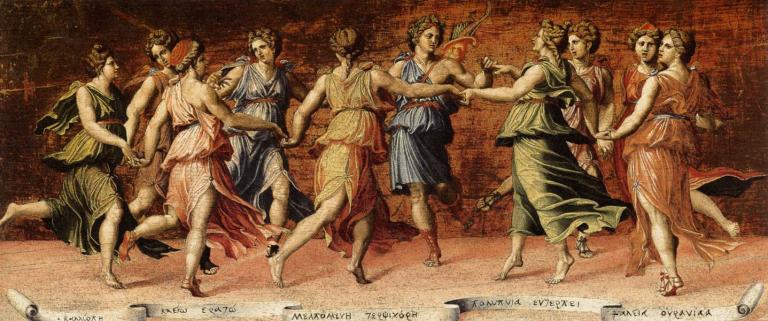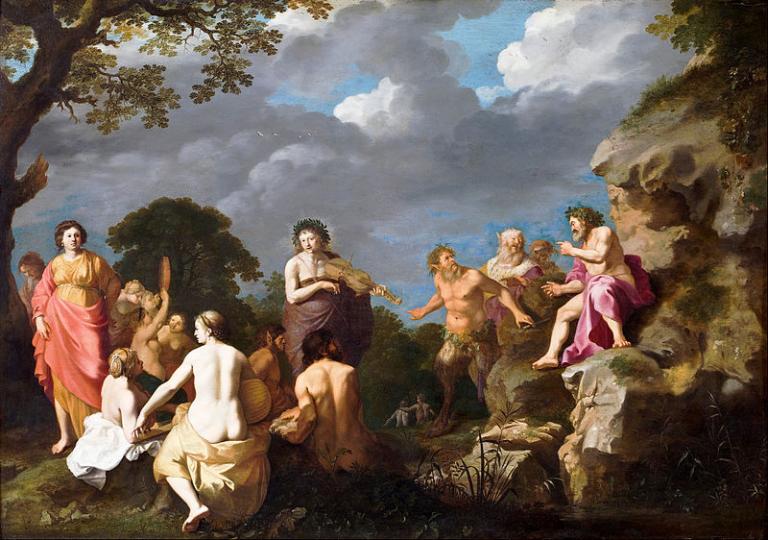This blog entry of the Hearth of Hellenism aims to address the dark side of academia in relationship to polytheistic practitioners that lead to a disconnect with Greeks in conversation concerning Hellenism.
One of the admirable qualities of polytheists is our interest in scholarly materials concerning ancient history, religion, and culture. Polytheists are often decently exposed to history; one of the main reasons someone becomes a polytheist, as I joke, is because they have read too much history to remain a monotheist. With this said, I need to raise awareness concerning the double-edged sword of academia. It can either inform us or distort and confuse without the right context.

I see myself as always stuck between worlds and balancing different hats. I am a graduate student of history with undergrad studies in religion. I am a Greek-American who follows the Greek tradition. These two sides, the academic and religious practitioner, clash at times but I have learned how to balance the sides better. I hope to show others how to balance academia with practice.
What do I specifically mean when I say that academia is a double-edged sword? An example will help to demonstrate; let us focus on the Gods – who are the Gods? In any religion, the deities of worship require familiarization and knowing – after all, who are these Gods which you worship? How do we understand the Greek pantheon? To borrow my two favorite terms from anthropology, you can understand the Gods etically and or emically. Etic refers to the analysis of culture from the outside perspective (observer) while emic refers to analysis from within the culture and social group by an internal participant.
Any question posed to me or that I answer can be answered either etically or emically: speaking as a Greek the answer represents an emic perspective; if I answer as an academic source of analysis, that is etic. One represents the inner perspective of a member of a group, and the other represents the academic tradition of outsiders trying to understand the subject. I see time and time again pagans building their understandings of the Gods through the etic scholarly sources.

An easy example of this would be to examine Aphrodite (Ἀφροδίτην). Emically, Aphrodite as per Hesiod’s Theogony is “the foam-born goddess” because her name contains ἀφρός, “sea-foam.” If you read the Wikipedia entry, though, you will read that “most modern scholars regard this as spurious folk etymology.” Of these two perspectives, one is only meaningful to a practitioner; what the ‘modern scholars regard’ should come secondary to a practitioner. What the scholar thinks is “spurious folk etymology” is an emic understanding with actual meaning to Greeks participating in and preforming religion as an insider.
The vast majority of scholarship out there is not from polytheists. Their work is not aimed towards practitioners, nor do they provide insight into the application for the 21st century. Why would you choose what they say over direct sources from antiquity that teach emically?
If more clarity is needed, allow me to quote W.K.C Guthrie as he says it best in The Greeks and Their Gods:
In the judgment of many scholars the Apollo of the Iliad is what he is because the Greeks took over and Hellenized a native Asiatic deity. But though this may be true, the result is not a clumsy dual personality…He is a single, living god, and a very great one. Since that is what he is to the Greeks, nothing else matters very much. This leads to the second point, that the more we investigate the complicated origins of the great Greek gods, the less we are looking at them as they appeared to Aeschylus or Sophocles. The new picture of them which we are forming is not the same… (Chapter Two, The Divine Family)
This critical factor is so often overlooked that I see time and time again pagans online talking about how the Greek pantheon “isn’t as Greek as we might think” or “XYZ God wasn’t originally Greek” and so many other statements in this vein. What I see as a Greek in these statements are individuals deeply invested in what a scholar at Harvard has to say, that what they practice is not Hellenism, but something else. I also see in some the desire to separate the Gods from their cultural context (and people) which gave you the Gods you worship today so that nothing certain can be known of the Gods, so do whatever you want.

In a closed Facebook group, someone wrote how I was “problematic” for “rejecting the multicultural origins of the Gods” and using inappropriate language in an online argument with someone that was confusing people. To that person who called me “problematic” – I am not rejecting the multicultural origins, whatever they may or not be, I am stressing what Guthrie stressed:
That the more we investigate the complicated origins of the great Greek gods, the less we are looking at them as they appeared to Aeschylus or Sophocles.
When I say the Gods are Greek, I am speaking like Aeschylus or Sophocles – not like a modern academic using information that an ancient Greek would not have been aware of. Their ethos was not defined in the ways modern scholars shape the past. If you want to know about the Gods in a meaningful way as a worshipper, you must do so emically. Because when you worship Apollo, what will help you know Apollo – his possible Asiatic roots, or what Plato has to say about Apollo? In the Cratylus there is an exchange between Socrates and Hermogenes which informs us concerning Apollo and many of the other Gods:
SOC. … Likewise in the case of Apollo, as I say, many people are afraid because of the name of the god, thinking that it has some terrible meaning. Have you not noticed that?
HER. Certainly; what you say is true.
SOC. But really the name is admirably appropriate to the power of the god.
HER. How is that?
SOC. I will try to tell you what I think about it; for no single name could more aptly indicate the four functions of the god, touching upon them all and in a manner declaring his power in music, prophecy, medicine, and archery.

HER. Go on; you seem to imply that it is a remarkable name.
SOC. His name and nature are in harmony; you see he is a musical god. For in the first place, purification and purgations used in medicine and in soothsaying, and fumigations with medicinal and magic drugs, and the baths and sprinklings connected with that sort of thing all have the single function of making a man pure in body and soul, do they not?
HER. Certainly.
SOC. But this is the god who purifies and washes away (ἀπολούων) and delivers (ἀπολύων) from such evils, is he not?
HER. Certainly.
SOC. With reference, then, to his acts of delivering and his washings, as being the physician of such diseases, he might properly be called Apoluon (ἀπολούων, the washer), and with reference to soothsaying and truth and simplicity—for the two are identical—he might most properly be called by the name the Thessalians use; for all Thessalians call the god Aplun. And because he is always by his archery controller of darts (βολῶν) he is ever darting (ἀεὶ βάλλων). And with reference to music we have to understand that alpha often signifies “together,” and here it denotes moving together in the heavens about the poles, as we call them, and harmony in song, which is called concord; for, as the ingenious musicians and astronomers tell us, all these things move together by a kind of harmony.
And this god directs the harmony, making them all move together, among both gods and men; and so, just as we call the ὁμοκέλευθον (him who accompanies), and ὁμόκοιτιν (bedfellow), by changing the ὁμο to alpha, ἀκόλουθον and ἄκοιτιν, so also we called him Apollo who was Homopolo, and the second lambda was inserted, because without it the name sounded of disaster (ἀπολῶ, ἀπόλωλα, etc.). Even as it is, some have a suspicion of this, because they do not properly regard the force of the name, and therefore they fear it, thinking that it denotes some kind of ruin. But in fact, as was said, the name touches upon all the qualities of the god, as simple, ever-darting, purifying, and accompanying.
Read the whole dialogue here.

As a graduate student, I am interested in all of what the scholarly tradition has to offer but as a Greek I do not adopt and apply it to my understanding of Apollo when I worship Him. The academic tradition and Greek tradition are two different things, and I know how to separate the two. Some, on the other hand, do not and side with the scholarly tradition as more authoritative and representative than Plato, for example.
I titled this post The Cult of Academia because of how attached to Oxford and Yale many practitioners are for informing them. This is a phenomenon unique to polytheists. You won’t find other traditions/religions where the practitioners side with academia to inform them concerning how they understand their Gods. Why do Pagans?


















